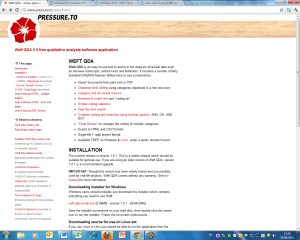Liz Lightfoot’s recent article “The value of area studies” in British Academy Review succinctly outlines the difficulties and challenges facing departments of area studies. In the eight plus years I have held the area studies remit for the Subject Centre for Languages, Linguistics and Area Studies, discussions about area studies invariably focus on the identity of the field–for example in 2004 LLAS ran a workshop entitled the Disciplinary Identity of Area Studies. In 2005, I attended a workshop entitled The Future of Interdisciplinary Area Studies run by the University of Oxford. In many respects the British Academy event The role of Area Studies in Higher Education in November 2010 was a revisiting of the Oxford conference. I even had the opportunity to reacquaint myself with many of the same people.
When I joined LLAS in 2003 my primary role was to run the Area Studies Project. A key aim of that project was build up an area studies community. There have been some successes. Driven by the project and in particular the vision of Dick Ellis, the then chair of the Area Studies Specialist Advisory Group the UK Council for Area Studies Associations (UKCASA) was formed in November 2003. It is pleasing to see that UKCASA is providing a strong voice for area studies in both teaching and research. Moreover, it has helped to bridge the gap between Anglophone and non-Anglophone area studies. The funding for the Language-based area studies centres was also an encouraging sign.
However, the questions raised when area studies is mentioned seem to be the same as they were eight years ago. And they are probably much the same as they were twenty, thirty, forty, fifty years ago. Department closures, the apparent rewarding of disciplinarily specialisation by the RAE and REF, the reliance of area studies programmes on ‘donor’ departments and questions of whether interdisciplinarity (more breath) inevitably means less depth leading to the suggestion that interdisciplinary courses might be a bit light, intellectually speaking. Naturally the latter is denied more area studies proponents who see the demands of area studies as more rather than less challenging.
Lightfoot’s article opens with the newsroom cry “Find someone who knows about Egypt!” in response the protests taking place there and elsewhere in the Middle East. Quoted in the article Tim Wright says “The problem with providing a national resource is that no one knows where the next area of concern will come from? Will it be a need for Kurdish specialists, or people with a deep knowledge of Afghanistan, Egypt or Pakistan?”
Or Canada maybe? Well probably not, but from a government perspective a key rationale for area studies is based on the national interest, the next protest or the next war. Talk is afoot of another referendum in Quebec, but whether that referendum, whatever its outcome, will generate much interest in the UK is unclear. The rationales for area studies tend focus on the need to understand the different, the unknown, the economically important and the dangerous. Perhaps the real worry is that we will never seek to understand those societies which we see as similar, known, economically unimportant and safe.
Reference: Lightfoot, L. (2011) The Value of Area Studies, British Academy Review 17, pp. 48-51








